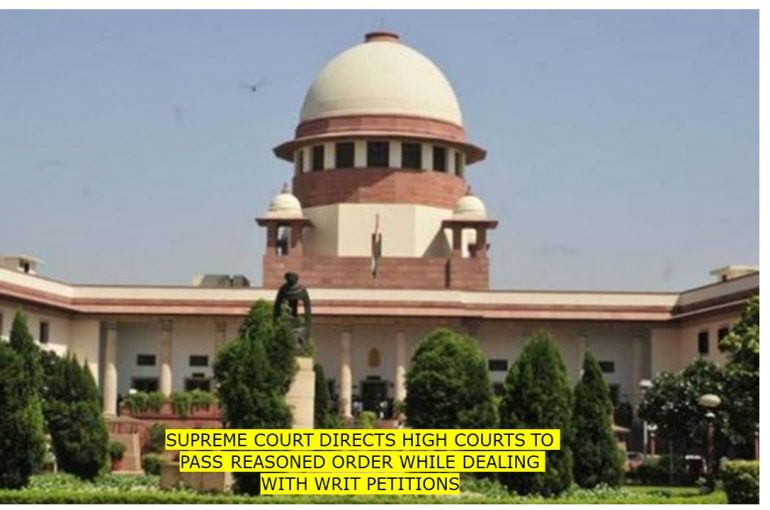SUPREME COURT DIRECTS HIGH COURTS TO PASS REASONED ORDERS WHILE DEALING WITH WRIT PETITIONS
Article 226 of the Constitution of India empowers the High Courts to issue writ in the nature of habeas corpus, mandamus, prohibitions, quo warranto and certiorari in order to protect and enforce the fundamental rights guaranteed by the Constitution.
A Division Bench of the Supreme Court, comprising of Justice M.R. Shah and Justice B. Nagarathna, while deciding the case of Vishal Ashwin Patel v. Assistant Commissioner of Income Tax Circle & ors., Civil Appeal No. 2200 OF 2022 on 28.03.2022, directed that the High Courts should pass reasoned orders after complete evaluation of grounds and merits of the case.
In this case, the Appellant, Mr. Vishal Ashwin Patel filed a Writ Petition before the High Court of Bombay against the re-opening of assessment by Assessing Officer under Section 148 of the Income Tax Act, 1961 (Issue of notice where income has escaped assessment). The High Court dismissed this Writ Petition without stating the reasons for the same, vide Order dated 11.01.2022. The Appellant preferred an Appeal against the said Order dated 11.01.2022 before the Supreme Court.
The Apex Court after considering the arguments advanced by the parties and the Order dated 11.01.2022 passed by the High Court, observed that the re-opening of assessment was challenged on several grounds, however the High Court has not considered any of the grounds and thereby dismissed the Writ Petition. The Supreme Court held the Order dated 11.01.2022 passed by the High Court to be cryptic, non-reasonable and thus unsustainable.
The Apex Court observed that while dealing with a Writ Petition under Article 226 of the Constitution, it was the duty of the High Court to deal with all the grounds taken by the Appellant to challenge the re-opening of assessment, before dismissing the Writ Petition. The High Court should also have considered if it was justified to raise the question of re-opening of assessment in a writ petition. The dismissal of Writ Petition without giving sufficient reason is a failure to perform duty on part of the High Court.
The Supreme Court, referred to the case of Central Board of Trustees Vs. Indore Composite Private Limited, (2018) 8 SCC 443, in which it was held that the courts need to pass a reasoned order in every case which must contain the narration of the bare facts of the case of the parties, the issues arising in the case, the submissions urged by the parties, the legal principles applicable to the issues involved and the reasons in support of the findings on all the issues arising in the case and urged by the learned counsel for the parties in support of its conclusion. The Apex Court further referred the recent case of Union Public Service Commission Vs. Bibhu Prasad Sarangi and Ors., (2021) 4 SCC 516, where the Supreme Court held that the reasons constitute the soul of judicial decision and how Judges communicate in their judgment is a defining characteristic of judicial process, since quality of justice brings legitimacy to the judiciary.
The Apex Court, after considering these judgements, applied the said law to the present case and observed that the High Court should have considered all the grounds and relevant documents urged by the parties and decide on merits before dismissing the Writ Petition.
The Supreme Court, thus allowed the Appeal preferred by the Appellant, thereby setting aside the High Court Order dated 11.01.2022 that dismissed the Writ Petition and further, remanded the case to the High Court to be decided on merits, keeping in view the principles laid down by the Apex Court.
Anuradha Kumari
Associate
The Indian Lawyer & Allied Services





































Leave a Reply